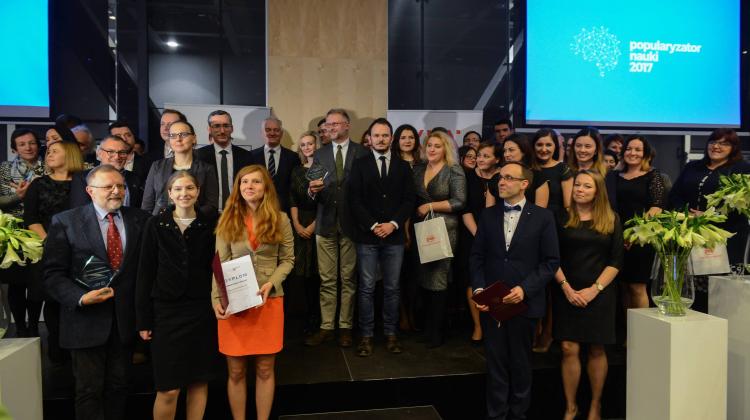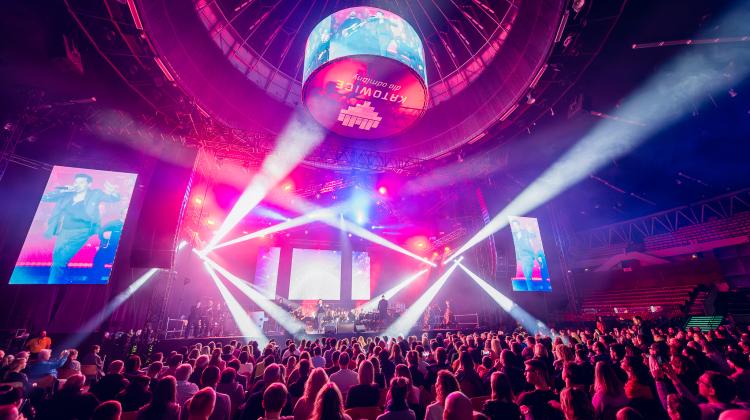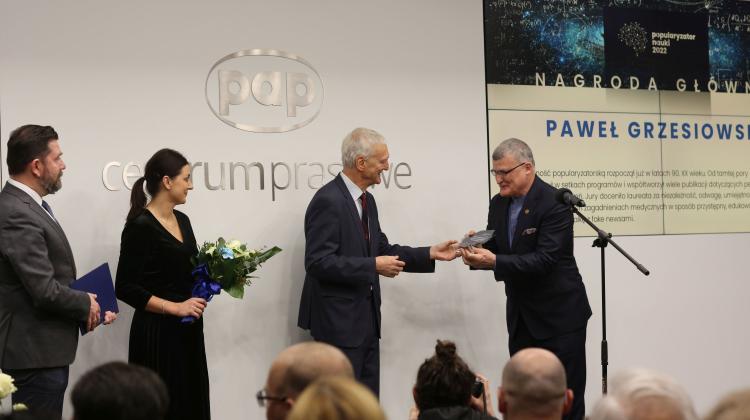Popularisers of Science 2017: Talk about science in an interesting way and do not be afraid of journalists
 Photo: PAP
Photo: PAP
Talk about science in an interesting way, describe not only research results, but also the making of science. Discover the knowledge together with your audience and do not to be afraid of journalists - the winners of the Popularisers of Science 2017 contest shared a few tips on how to successfully promote scientific knowledge.
The results of the 13th edition of the contest were announced last Monday in Warsaw, during a gala at the Copernicus Science Centre. The ceremony was attended by Deputy Prime Minister, Minister of Science and Higher Education Jarosław Gowin and President of the Polish Press Agency Wojciech Surmacz.
The jury selected the winners in five categories: Scientist, Animator, Institution, Team and Media. The jury chaired by Prof. Kleiber granted the main lifetime achievement award to Prof. Tadeusz Wibig from the University of Lodz.
"Physics taught at school is completely different from the physics that one does at universities, at institutes. Physics at school is solving problems that someone has made up and told children to solve, like a puzzle" - told PAP the University of Lodz professor. He believes that physics is really "solving puzzles that nature itself has put together".
"I\'m a physicist by education. I\'ve been doing scientific work for a very long time. I\'ve tried to understand how this world is built, how it works. When it finally seemed to me that I understood everything (...) I decided that I should actually explain it all to others" - recalls the laureate. It turns out that the people interested most in his shows are children.
"To make it (physics - PAP) fascinating, it should be done in a way that resembles real science. The science of physics is an experimental science, where knowledge about reality is obtained by doing experiments. This is the most informative, the most educative way for children, and it\'s most fun" - Prof. Wibig believes. He adds that the effects of experiments are surprising, but they should be explained.
Deputy Prime Minister, Minister of Science and Higher Education Jarosław Gowin, handing the awards to the winners, emphasized that in this moment in Polish history, the activity of promoters was more important than in the past.
"As a country, we are in the process of implementing the Responsible Development Strategy. This project is designed to push the Polish economy onto a new track - the track of innovation, development of these modern sectors of our economy" - he said.
"In short, we need to explain Polish citizens why it is worth it, why it pays to invest in science" - he emphasized. He believes that the whole society has to be convinced that Polish universities or research institutions are worth reforming. "Nobody can do it as effectively as promoters" - he noted.
President of the Polish Press Agency, Wojciech Surmacz, also spoke about the need to support science in Poland. "It is worth investing in Polish science, as an economic journalist I have repeatedly learned that Polish science is dramatically underinvested" - he said.
Like every year, the editors of PAP - Science and Scholarship in Poland granted special Tomasz Trzciński Award for the benchmark information policy. The award went to the Institute of Zoology at the University of Life Sciences in Poznań.
"You definitely should not be afraid of journalists" - argues its director, Prof. Piotr Tryjanowski. According to the researcher, there is a group of journalists and a way of promoting science in Poland that "talks not only about the results we get, but about the making of science, getting to that result".
Prof. Szymon Malinowski from the University of Warsaw also argues that presenting the sources of scientific investigations is just as important as presenting their results. His group of authors of the website Naukaoklimacie.pl received the award in the Team category.
"We bust climate myths on our website. The recipe is this: tell the truth, the whole truth and nothing but the truth. And cite scientific sources. Science knows the reasons for climate changes that happened in the past, possible reasons for future climate changes, and it knows that we - humans - are responsible for global warming" - Prof. Malinowski told PAP. He noted that in Poland neither universities nor scientific institutions that deal with this issue publish information on climate changes on their websites. "Well, someone had to do it!" - he added.
Shortcomings in the promotion of astronomy have been noticed by the author of the show "Astronarium" on TVP Bydgoszcz. Bogumił Radajewski is this year\'s laureate in the Media category. His goal is to show the universe in the context of research conducted by Polish astronomers.
"I am convinced that even on a television dominated by soap operas and game shows there is also a place for science, for scientific shows and series. The condition is that science must be discussed in a way that people will find interesting" - he believes.
In their work, promoters appreciate the possibility of engaging in discussions - not only with scientists.
"Promotion allows me to engage in very interesting discussions, (...) answer often very difficult questions asked by the audience. Discovering this knowledge together with the audience, tying the individual facts together, is what gives me the greatest pleasure" - says Dr. Andrzej Katunin from the Silesian University of Technology, winner in the Scientist category. The researcher\'s field of expertise is fractal geometry.
"I\'ve always had a problem with talking to my loved ones about astronomy, my major. During my fourth year I wanted to talk to my mother about black holes, a red giant... She was completely bored. And I knew that it was very interesting" - recalls Jan Świerkowski, winner in the Animator category, founder of the B61 Institute. It is a group of artists and scientists who - as Świerkowski describes - develops interesting ways of communicating with the public. These are spectacular performances in spaces that normally have very little to do with science - a factory, a train or a train station.
Not all scientists are so eager to do promotion work. "The beginnings were very difficult, especially when it came to persuading employees that this activity is important, needed. It was quite often contested. What should we do that for? But now we have enthusiasts who are asking: What should we do next?" - said the director of the Institute of Animal Reproduction and Food Research of the Polish Academy of Sciences in Olsztyn, Prof. Mariusz K. Piskuła. His institute won in the Institution category. Prof. Piskuła emphasised that this is an award for 10 years of hard work.
"We did not expect it to develop so much that the recognition at the national level would be rewarded with today\'s prize" - he added.
PAP - Science in Poland, Szymon Zdziebłowski
szz/ agt/ kap/
tr. RL
Przed dodaniem komentarza prosimy o zapoznanie z Regulaminem forum serwisu Nauka w Polsce.















